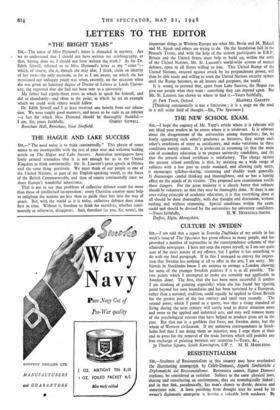RESISTENTIALISM
Si,—Students of Resistentialism in this country may have overlooked the illuminating monograph by Coleb-Damasci, Aspetti Simbiotichi e Diplomatichi del Resistenzialisrno. Resistentia cannot, Signor Damasci explains, be considered in isolation. Subject to the same physical laws, sharing and constituting an environment, they are econologically linked ; and in that link, paradoxically, lies man's chance to divide, deceive and sometimes rule. A lawn perishing from drought may be saved by its owner's diplomatic enterprise in leavine a valuable book outdoors. By
a variation of this principle the grim persistence of watched pots in not. boiling can be harnessed to prevent the ruin of a custard. (Signo.. Damasci gives a fascinating account of his successful deception of a zabaglione.) The present writer has experimented successfully with grass- seed which, scattered on a garden path, was deceived into transferring itself overnight to a bare patch of lawn. (The reverse process is, of course, familiar to all gardeners.) On a larger scale, man's partial taming of the yeasts, moulds and bacilli generally to produce bread, cheese, liquor and the vaccines and antibiotics may justly be claimed as a triumph of deception over non- human organisms naturally antagonistic to the human ideals of preserva- tion and asepsis. No light is cast by Signor Damasci on the relation between rakes and noses, hammers and thumbs, broken glass and bicycle tyres, and other symbiotic affinities hitherto insusceptible to the tech- nique of deception ; but he has, at all events, notably circumscribed the
area of fatalism.—Yours faithfully, HONOR CROOME. Pearmain, Ruxley, Claygate, Surrey.



































 Previous page
Previous page